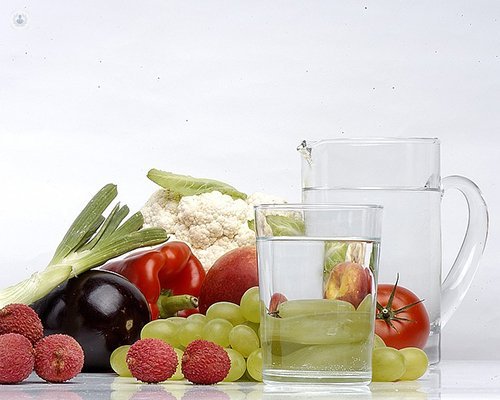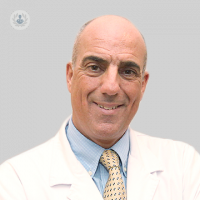Constipation what is the best treatment?
Written by:There are currently several treatments for constipation, but none is definitive for all cases, but a good treatment of this disease must undergo cater individually to the patient and to know the cause of constipation, as well as the characteristics of the. Generally, the recommended treatment by specialists Digestive contains measures such as proper hydration, high - fiber diet, physical exercise and a schedule for toileting and when necessary the use of drugs.
Diet for constipation
Dietary fiber in the diet causes an increased stool volume and a  decreased consistency and reduced time to pass through the colon, whereby the vegetable fiber diet can be beneficial for treating constipation.
decreased consistency and reduced time to pass through the colon, whereby the vegetable fiber diet can be beneficial for treating constipation.
Furthermore, the vegetable fiber has the capacity to retain water in the colon, which is able to increase the volume and weight of stool consistency and decrease, facilitating defecation. The best of these effects is that they are not excessive, and fail to produce diarrhea; in fact, the fiber is also recommended for patients with diarrhea due to their ability to absorb water from the colon.
However, it should be noted that too much fiber can even worsen symptoms by increasing the feeling of bloating. The recommended amount of vegetable fiber is about 25-30 grams daily, and can be taken as wheat bran, fruit like kiwis or plums, or vegetables such as green beans or chard.
Sufficient fluid intake provides adequate stool consistency; however, insufficient intake favors that they are hard and dry. Therefore, it is very important to treat constipation drink plenty of fluids, especially water, but also milk, fruit juice, tea or broth.
Depositional habit for constipation
It is essential not to ignore the desire defecation, and devote the necessary time, making it a regular habit. It is also advised to go to the bathroom always at the same time, better after some food and calm and relaxed.
Laxatives for constipation
Laxatives are pharmacological agents widely used in the treatment of constipation in order to promote bowel movement. The most recommended are those forming laxatives volume (such as cellulose derivatives and psyllium seed), saline (such as magnesium salts) or nonabsorbable sugars (such as lactulose, polyethylene glycol or lactitol).
In contrast, chronic use of stimulant laxatives or irritants should be avoided as they can damage the intestinal nervous system and increase and perpetuate constipation.
Biofeedback sphincter for constipation
Biofeedback or sphincter reeducation is a learning technique based on the patient to control bodily functions that previously had no awareness. Biofeedback is specifically aimed at improving the ability to empty the rectum will of the patient, teaching him to recognize the rectal distension, which is the feeling of defecation desire to perform compression of the right abdomen and relax the anal sphincter.
To perform the biofeedback a very thin probe that measures movements in the area during defecation is used; that patients themselves are displayed on a television monitor to become aware of the changes and can modify them.
Psychological help for constipation
Some patients with constipation, especially those with a normal transit, have higher incidence of psychological disorders than people who are not constipated. In these patients the response to treatment is less effective, and a therapeutic approach in which included psychological support is required.
Surgery for constipation
Surgical treatment is reserved for very specific cases suffering from a significant decrease in colon movements and have not responded well to medical treatment. In these cases a colectomy is performed, surgery to remove the colon.
Since it is a very important intervention and the results are not always satisfactory is very rare that you l surgical treatment. Instead, what we usually requires surgical treatment are the complications that causes constipation, such as hemorrhoids or anal fissures.
10 tips to end constipation
- Eating a diet rich in fiber.
- Drink plenty of water.
- Physical exercise.
- Potty always at the same time.
- Breakfast something solid, something liquid and something hot.
- Be willing to answer the call of the intestine.
- Raise your legs a bit during the evacuation.
- Try to relax the anus during defecation.
- Avoid self-medication.
- Steadfastness, constancy and perseverance.
Constipation in pregnancy
Up to 40% of women suffer from constipation during pregnancy and can occur at any time of it, although it is more common in the last phase.
The root cause of this constipation are hormonal changes that occur during pregnancy. Another contributing factor is the presence of constipation and rectal intestinal compression due to increased size of the uterus. Sedentary lifestyle, insufficient intake of water and fiber, the difficulty for exercise and use of certain medications further worsen constipation.
Symptoms that produces constipation during pregnancy vary depending on the case: can range from anal pain during bowel movements and sensation of incomplete evacuation, to severe pain and bleeding hemorrhoids and anal fissures. It is necessary to prevent and treat constipation in pregnancy because of the discomfort it causes that can influence the quality of life of women. Thus, will be used primarily to basic dietary measures and should be insufficient to using laxatives, only those safe for both the fetus and the pregnant.
Constipation Research
Medical research has been directed for many years just to try to know the unknown in the field of medicine, while other diseases or symptoms, being more frequent, seemed less important forgot. In addition, the doctor focused on those organic diseases, with a visible cause like an ulcer, a Tumo or inflammation, etc.. Instead, when the disorder was probably due to a malfunction of the body, ie so-called functional diseases, medical interest waned.
However, lately there have been discoveries on the causes of this type of discomfort: heavy digestions, stings, constipation, etc.. So now we know much more than before on the causes of constipation. To get the perfect treatment research is needed, which should also be involved patients: without their cooperation can not get the breakthrough Medicine.


